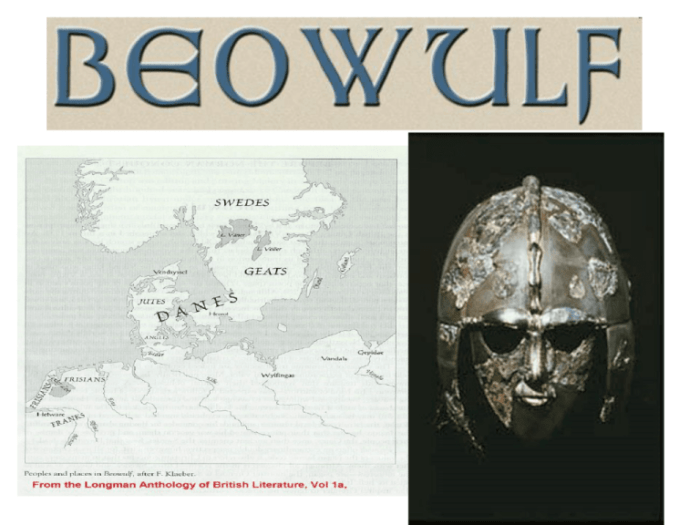In the tapestry of Anglo-Saxon literature, fame stands as a vibrant thread, woven into the fabric of epic tales. How important is fame to Beowulf? This essay embarks on an exploration of the significance of fame in the Anglo-Saxon world, examining its role in shaping the motivations, actions, and legacy of the legendary hero Beowulf.
Anglo-Saxon culture held fame and reputation in high esteem, as they were inextricably linked to honor, status, and the preservation of one’s legacy. Beowulf’s quest for fame, driven by a desire for eternal glory and the preservation of his name, became the driving force behind his perilous journey to Denmark and his subsequent battles against formidable foes.
Fame in Anglo-Saxon Culture: How Important Is Fame To Beowulf

In Anglo-Saxon society, fame and reputation were highly valued and played a significant role in shaping individuals’ status and influence. Renown was not merely a personal attribute but a collective achievement that reflected one’s contributions to the community.
Anglo-Saxon culture placed great emphasis on heroic deeds and loyalty. Warriors who demonstrated bravery and skill in battle could gain fame and respect. Fame could also be achieved through other means, such as generosity, wisdom, and eloquence. Individuals who displayed these qualities were often praised in songs and poems, which further enhanced their reputation.
Preserving Fame
Once achieved, fame needed to be maintained and protected. This was done through various means, including:
- Reciting heroic deeds:Anglo-Saxons frequently recounted the exploits of their heroes in oral poetry and storytelling. This helped to keep the memory of their achievements alive and inspire future generations.
- Preserving family lineages:Anglo-Saxons placed great importance on family lineage. Individuals who could trace their ancestry back to renowned ancestors could inherit their fame and prestige.
- Building alliances:Establishing alliances with powerful individuals or groups could provide protection and enhance one’s reputation. Fame could be gained through association with those who were already well-respected.
Beowulf’s Quest for Fame

Beowulf’s journey to Denmark was primarily driven by his desire for fame and glory. The Anglo-Saxon culture placed great importance on reputation and valor, and Beowulf sought to establish himself as a legendary warrior.
Fame as a Motivator
Beowulf’s actions throughout the epic are largely influenced by his pursuit of fame. He eagerly accepts the challenge to fight Grendel, not only to protect the Danes but also to gain recognition for his bravery. His subsequent battles with Grendel’s mother and the dragon are further testaments to his unwavering quest for glory.
Fame and Decision-Making
Beowulf’s decisions are often guided by his desire for fame. He chooses to stay in Denmark for a second battle against Grendel’s mother, even though he has already defeated Grendel. This decision demonstrates his willingness to risk his life for the sake of his reputation.
Fame and Legacy
Beowulf’s quest for fame ultimately results in his legendary status. His heroic deeds are celebrated in songs and stories, ensuring that his name will be remembered long after his death. The epic of Beowulfitself serves as a testament to the enduring power of fame and the human desire for immortality.
The Consequences of Fame

Beowulf’s fame brought both positive and negative consequences. On the one hand, it made him a respected and admired hero, granting him access to the courts of kings and the respect of his peers. On the other hand, it also brought him into the limelight, making him a target for envy and treachery.
Positive Consequences
- Beowulf’s fame made him a respected and admired hero.
- It granted him access to the courts of kings and the respect of his peers.
- It allowed him to travel and experience different cultures.
Negative Consequences, How important is fame to beowulf
- Beowulf’s fame made him a target for envy and treachery.
- It put pressure on him to maintain his reputation.
- It made it difficult for him to form genuine relationships.
Ultimately, Beowulf’s fame was a double-edged sword. It brought him great glory and respect, but it also came at a price. Beowulf’s story serves as a reminder that fame can be both a blessing and a curse.
Fame and the Epic Tradition
In Anglo-Saxon culture, fame was a powerful force that motivated warriors and shaped the narrative of their epic poems. Beowulf, the hero of the eponymous poem, is driven by a desire for fame and glory. His quest for fame shapes the narrative structure and themes of the poem, as he travels to different lands and faces various challenges in order to gain renown.
Comparison to Other Anglo-Saxon Epics
The portrayal of fame in Beowulf is similar to that found in other Anglo-Saxon epics, such as The Battle of Maldon and The Wanderer. In these poems, fame is seen as a desirable goal, and warriors are willing to risk their lives in order to achieve it.
However, Beowulf is unique in its exploration of the consequences of fame. While Beowulf eventually achieves his goal of becoming a famous warrior, he also experiences the negative consequences of his fame, such as envy and betrayal.
Influence on Narrative Structure and Themes
Beowulf’s quest for fame shapes the narrative structure of the poem. The poem is divided into two parts, with the first part focusing on Beowulf’s youth and his rise to fame, and the second part focusing on his later years and his eventual death.
The poem’s themes are also shaped by Beowulf’s quest for fame. The poem explores the themes of heroism, loyalty, and the importance of reputation.
FAQ Insights
What was the significance of fame in Anglo-Saxon society?
Fame and reputation were highly valued in Anglo-Saxon culture, as they were associated with honor, status, and the preservation of one’s legacy.
What motivated Beowulf’s quest for fame?
Beowulf’s desire for eternal glory and the preservation of his name drove him to embark on his perilous journey to Denmark and face formidable foes.
How did Beowulf’s fame influence the events of the epic?
Beowulf’s reputation inspired loyalty and admiration, but also attracted envy and treachery. It shaped the course of events, influencing his relationships, decisions, and ultimately, his heroic destiny.